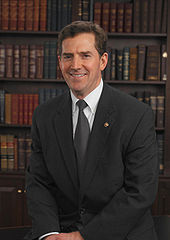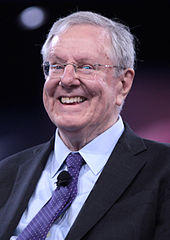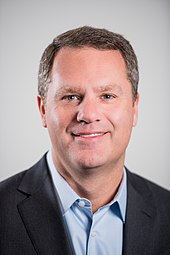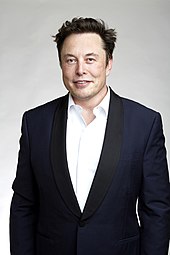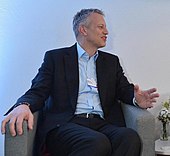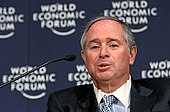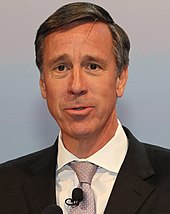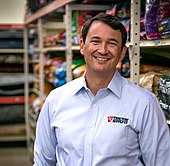
Henry Ross Perot Sr. was an American businessman, politician and philanthropist. He was the founder and chief executive officer of Electronic Data Systems and Perot Systems. He ran an independent campaign in the 1992 U.S. presidential election and a third-party campaign in the 1996 U.S. presidential election as the nominee of the Reform Party, which was formed by grassroots supporters of Perot's 1992 campaign. Although he failed to carry a single state in either election, both campaigns were among the strongest presidential showings by a third party or independent candidate in U.S. history.

Anthony Stephen Fauci is an American physician-scientist and immunologist who served as the director of the National Institute of Allergy and Infectious Diseases (NIAID) from 1984 to 2022, and the chief medical advisor to the president from 2021 to 2022. Fauci was one of the world's most frequently cited scientists across all scientific journals from 1983 to 2002. In 2008, President George W. Bush awarded him the Presidential Medal of Freedom, the highest civilian award in the United States, for his work on the AIDS relief program PEPFAR.

Stephen Moore is an American conservative writer and television commentator on economic issues. He co-founded and served as president of the Club for Growth from 1999 to 2004. Moore is a former member of the Wall Street Journal editorial board. He worked at The Heritage Foundation from 1983 to 1987 and again since 2014. Moore advised Herman Cain's 2012 presidential campaign and Donald Trump's 2016 presidential campaign.

Alex Michael Azar II is an American attorney, businessman, lobbyist, and former pharmaceutical executive who served as the U.S. secretary of health and human services from 2018 to 2021. He was also chairman of the White House Coronavirus Task Force from its inception in January 2020 to February 2020, when he was replaced by Vice President Mike Pence.

Stephen Michael Hahn is an American physician who served as the commissioner of food and drugs from 2019 to 2021. Before becoming commissioner, he was an oncologist serving as chief medical executive of the MD Anderson Cancer Center. In 2021, he became chief medical officer at Flagship Pioneering, the venture capital firm that launched Moderna.
The Business Council is a nonpartisan organization of business leaders headquartered in Washington, D.C. It holds meetings several times a year for high-level policy discussions.

Steven Charles Witkoff is an American attorney, real estate investor and developer, philanthropist, and founder of the Witkoff Group. He practiced as a real estate attorney for the first few years of his career, then pivoted to become a real estate investor and developer. Among other buildings, he has purchased or co-purchased 33 Maiden Lane, the Daily News Building, the Woolworth Building, and the Park Lane Hotel in Manhattan.

Deborah Leah Birx is an American physician and diplomat who served as the White House Coronavirus Response Coordinator under President Donald Trump from 2020 to 2021. Birx specializes in HIV/AIDS immunology, vaccine research, and global health. Starting in 2014, she oversaw the implementation of the President's Emergency Plan for AIDS Relief (PEPFAR) program to support HIV/AIDS treatment and prevention programs in 65 countries. From 2014 to 2020, Birx was the United States global AIDS coordinator for presidents Barack Obama and Donald Trump and served as the United States special representative for global health diplomacy between 2015 and 2021. Birx was part of the White House Coronavirus Task Force from February 2020 to January 2021. In March 2021, Birx joined ActivePure Technology as Chief Medical and Science Advisor.
The following is a list of notable events, births and deaths from 2020 in the United States.

The 2020 Oval Office address, officially titled On the Coronavirus Pandemic, was the second televised, prime-time Oval Office address during the presidency of Donald Trump, delivered on March 11, 2020 at 9:01PM EDT. It was released during the rapidly spreading COVID-19 pandemic and the 2020 stock market crash.
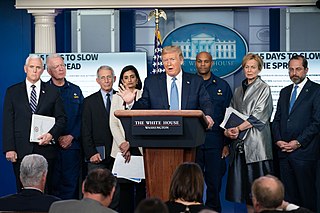
The White House Coronavirus Task Force was the United States Department of State task force during the Trump administration. The goal of the Task Force was to coordinate and oversee the administration's efforts to monitor, prevent, contain, and mitigate the spread of coronavirus disease 2019 (COVID-19). Also referred to as the President's Coronavirus Task Force, it was established on January 29, 2020, with Secretary of Health and Human Services Alex Azar as chair. On February 26, 2020, U.S. vice president Mike Pence was named to chair the task force, and Deborah Birx was named the response coordinator.

The Coronavirus Aid, Relief, and Economic Security Act, also known as the CARES Act, is a $2.2 trillion economic stimulus bill passed by the 116th U.S. Congress and signed into law by President Donald Trump on March 27, 2020, in response to the economic fallout of the COVID-19 pandemic in the United States. The spending primarily includes $300 billion in one-time cash payments to individual people who submit a tax return in America, $260 billion in increased unemployment benefits, the creation of the Paycheck Protection Program that provides forgivable loans to small businesses with an initial $350 billion in funding, $500 billion in loans for corporations, and $339.8 billion to state and local governments.
Planning and preparing for pandemics has happened in countries and international organizations. The World Health Organization writes recommendations and guidelines, though there is no sustained mechanism to review countries' preparedness for epidemics and their rapid response abilities. National action depends on national governments. In 2005–2006, before the 2009 swine flu pandemic and during the decade following it, the governments in the United States, France, UK, and others managed strategic health equipment stocks, but they often reduced inventory after the 2009 pandemic in order to reduce costs.

President Donald Trump's administration communicated in various ways during the COVID-19 pandemic in the United States, including via social media, interviews, and press conferences with the White House Coronavirus Task Force. Opinion polling conducted in mid-April 2020 indicated that less than half of Americans trusted health information provided by Trump and that they were more inclined to trust local government officials, state government officials, the Centers for Disease Control and Prevention (CDC), and National Institute of Allergy and Infectious Diseases director Anthony Fauci.
Republican Accountability (RA), formerly Republican Accountability Project (RAP) and, for the current presidential election, Republican Voters Against Trump (RVAT), is a political initiative launched in May 2020 by Defending Democracy Together for the 2020 U.S. presidential election cycle. The project was formed to produce a US$10 million advertising campaign focused on 100 testimonials by Republicans, conservatives, moderates, right-leaning independent voters, and former Trump voters explaining why they would not vote for Donald Trump in 2020. By August 2020, they had collected 500 testimonials.

The federal government of the United States initially responded to the COVID-19 pandemic in the country with various declarations of emergency, some of which led to travel and entry restrictions and the formation of the White House Coronavirus Task Force. As the pandemic progressed in the U.S. and globally, the U.S. government began issuing recommendations regarding the response by state and local governments, as well as social distancing measures and workplace hazard controls. State governments played a primary role in adopting policies to address the pandemic. Following the closure of most businesses throughout a number of U.S. states, President Donald Trump announced the mobilization of the National Guard in the most affected areas.
COVID-19 testing in the United States can identify whether a person is infected with SARS-CoV-2, the virus which causes COVID-19. This helps health professionals ascertain how bad the epidemic is and where it is worst. The accuracy of national statistics on the number of cases and deaths from the outbreak depend on knowing how many people are being tested every day, and how the available tests are being allocated.
Olivia Troye is an American national security official who worked on national security and homeland security issues at the National Counterterrorism Center, the United States Department of Energy Office of Intelligence and Counterintelligence, and the DHS Office of Intelligence and Analysis.
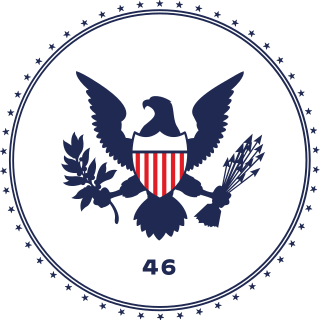
The COVID-19 Advisory Board was announced in November 2020 by President-elect of the United States Joe Biden as part of his presidential transition. It was co-chaired by physicians David A. Kessler, Marcella Nunez-Smith, and Vivek Murthy and comprises 13 health experts. The board was then succeeded by the White House COVID-19 Response Team upon Biden's presidency in January 2021.

Misinformation related to the COVID-19 pandemic has been propagated by various public figures, including officials of the United States government. The Trump administration in particular made a large number of misleading statements about the pandemic. A Cornell University study found that former U.S. President Donald Trump was "likely the largest driver" of the COVID-19 misinformation infodemic in English-language media, downplaying the virus and promoting unapproved drugs. Others have also been accused of spreading misinformation, including U.S. Secretary of State Mike Pompeo, backing conspiracy theories regarding the origin of the virus, U.S. senators and New York City mayor Bill de Blasio, who downplayed the virus.



